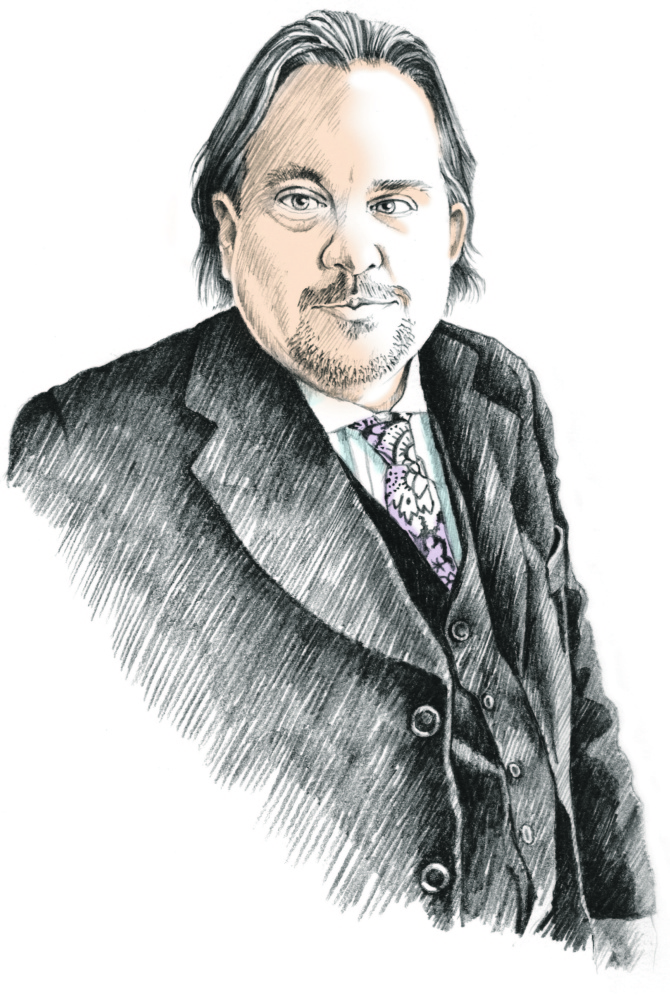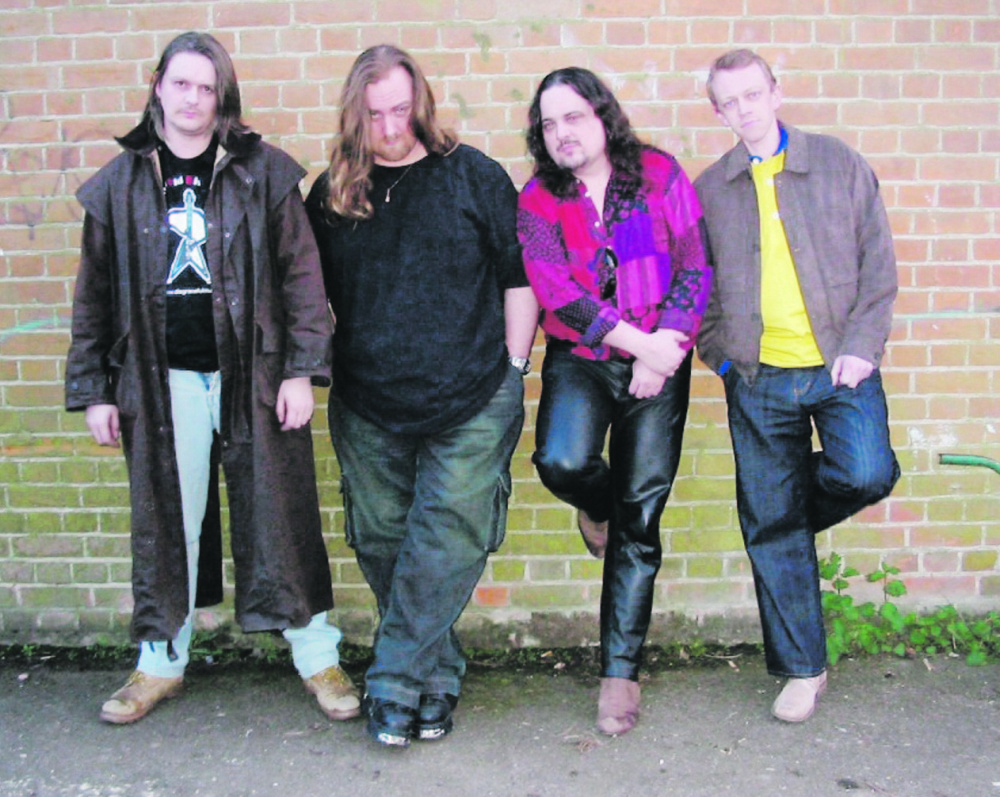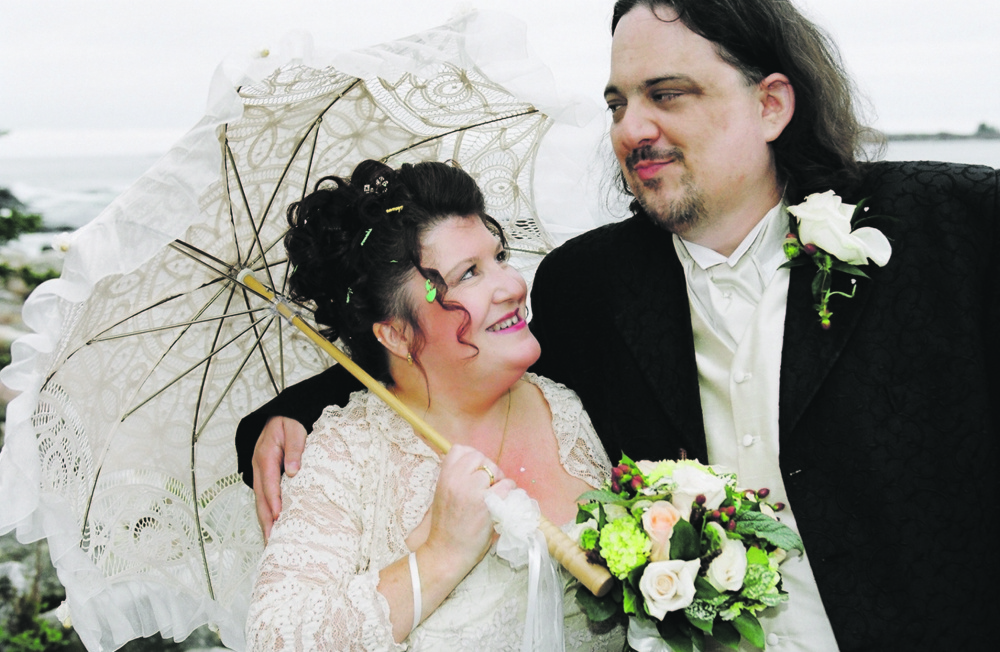He didn’t look the part of the conservative activist. With his shoulder-length hair, goatee, black overcoat, sunglasses and wide-rimmed black leather hat, he looked more like an aging rocker, video gamer or sci-fi fan – a fish out of water at more straightlaced conservative functions.
Andrew Ian Dodge had a rock band, wrote science fiction novels and played and reviewed video games, but he also had two degrees in government, nearly two decades of experience in conservative politics in Britain, a deep understanding of political philosophers, and communications skills honed in debating societies and think tanks on both sides of the pond. All of this became apparent once he started talking.
He described himself as a “non-Ron Paul libertarian” or, more precisely, as a Gladstonian liberal, a champion of the 19th-century laissez-faire liberalism of British Prime Minister William Gladstone, a tradition arguing that individual freedom is the essential goal of a good society and is best achieved by limiting the size and scope of government. Talking politics with him was a pleasure: He was thoughtful, colorful and was clearly devoted to his principles, rather than a party, an individual or developing his own political base. He deplored authoritariansm and thuggery, regardless of whom was giving or receiving it.
“He was a strikingly original individual – there are not very many copies out there,” said his friend Tom Burroughes, a London-based financial journalist. “With his appearance, people wouldn’t know what to make of him at first, but he was a very generous and good natured and actually very honorable person. He was also incredibly well connected; he was the best networker I have ever met.”
David Weigel, a Washington, D.C.-based political writer for Slate, also became friends with Dodge. “He had this joie de vivre about activism that really made him stand out,” said Weigel, who covered the tea party extensively. “He wasn’t pretentious and he clearly wasn’t in it to build a power base for himself. He just wanted government to get off his back so he could play music.”
His wife, Kim Dodge put it this way: “Politics was like his sport and in his bones. Music was how he relaxed, although he worked very hard at everything he did.”
Dodge, one of Maine’s most interesting political figures, was perhaps best known here for launching a primary challenge against U.S. Sen. Olympia Snowe in 2011, an effort confounded by her sudden retirement months before the vote. But his career was much broader than that. At Margaret Thatcher’s think tank in the 1990s, he fought European integration and was an early and prominent tea party organizer on the American stage, helping establish what was once the movement’s largest group, the Tea Party Patriots. He also reviewed music, games and books for Blogcritics and had a regular column in the Brunswick Times-Record.
In February, Dodge wrote me and said his cancer had returned. If he lost the battle, he asked that I write his obituary. I was humbled by both his request and his courage in facing death; I wrote that I surely would but hoped it wouldn’t come to that.
Dodge died Aug. 1 at his home in Harpswell. He was 46.
A GLOBAL CHILDHOOD
All of Dodge’s family members were Mainers: descendants of the early settlers of Massachusetts and Quebec and their progeny who came to coastal Maine in the late 18th and late 19th century, respectively, in search of opportunity. His grandfather Duna Dodge was an East Boothbay shipbuilder, but his father, Arthur, was a chemical engineer for Texaco, which transferred him from posting to posting around the world, his family in tow.
Andrew Ian Dodge was born Dec. 18, 1967, in New York City and spent his early years in New Jersey, where his father worked. When he was 4, his father was reassigned to a refinery in Pembrokeshire, Wales, where Dodge attended a tiny village school. Many of his earliest memories, appropriately enough, were of the United Kingdom. In the summer of 1974, his father became assistant manager of another Texaco refinery in Puerto Cortez, Honduras; the family lived there for 31/2 years and Dodge, an only child, became fluent in Spanish. This came in handy at his father’s final posting in Miami – home to the regional office for the oil giant’s West African and Central American operations – where he attended middle and high school.
“That’s why Andrew was so gregarious,” Kim Dodge said. “He had to meet new people all the time.”
Maine was always in the picture – summer camp on the Allagash, family gatherings in the midcoast – and his parents moved to Harpswell upon his father’s retirement in 1989. By then, Dodge was a senior at Colby College in Waterville, a government major, a leading figure in the Young Republicans and the host of a live Saturday night heavy metal show on the college’s radio station.
“A great many people have views when they’re 30 that are very different from when they were in college,” said his mother, Elizabeth, who recalled his disgust with the “political correctness” movement then at its zenith on U.S. college campuses, with its attempts to apply zoning regulations to free speech. “Andrew never changed his views.”
Even then, the Maine Republican Party could be a difficult place for a 19th-century classical liberal. Dodge was frustrated with the state’s Yankee Republican establishment, which he compared to Europe’s Christian Democrats: “They practice consensus politics, don’t want to get anybody upset and do it to get along and get along,” he told me in one of our conversations. “I was so fed up that I buggered off to the U.K.”
ACROSS THE POND
In 1991, while enrolled in a graduate communications program at the University of Maine, he wrote Thatcher, who had just ended her tenure as Britain’s prime minister, seeking an internship. His mother advised him not to include his radio show and already-prodigious reviewing of heavy metal albums on his curriculum vitae, but he kept them and it paid off.
John Whittingdale, Thatcher’s political secretary, member of the Order of the British Empire and future Conservative member of parliament, was a heavy metal aficionado, saw the application and offered Dodge a position at her think tank, the Bruges Group.
“John Whittingdale later said he was looking at the CVs and they were all very boring and then he got to Andrew, a heavy metal rocker who was into politics,” Kim Dodge said. “And that’s how Andrew came over.”
Her husband spent the better part of the next two decades in the U.K. Through the Bruges Group – the early hub of British “Euroskeptics” opposed to delegating sovereignty to the then-nascent European Union – he worked on election campaigns. He earned a postgraduate degree in legislative studies from Hull University and wrote a series of sci-fi novels about a dystopian future in which the EU would become a despotism. He had a rock band and reviewed albums by the dozens.
He cut an unconventional figure among fellow members of the Young Conservatives, with his rocker appearance and American directness.
“He was a familiar figure at London Conservative functions in the mid-1990s, as well as at the national party conferences, always a boisterous presence,” said friend Daniel Hannan, now a Euroskeptic member of the European Parliament. “He saw British and American conservatives as being engaged in a common enterprise, in defense of common values. Though the word ‘Anglosphere’ had not become current in those days, Andrew was an Anglospherist avant la lettre.”
Burroughes, a co-member of Dodge’s rock band, Growing Old Disgracefully, recalled his friend’s prodigious writing, including song lyrics, five sci-fi novels, political essays and reviews of books, video games, concerts and albums. “He was prolific and produced an enormous amount of output over a great range of area.”
Dodge was one of the early bloggers, developing a transatlantic following among Libertarians and heavy metal fans alike. “Here was this interesting guy who had a vivid life and was into sci-fi and music – and I was into sci-fi and music – and so here was this person that without the Internet I would never have become friends with,” said David Weigel. “You knew you were talking to a real person who cared about this stuff as opposed to an activist or power-seeker.”
Raheem Kassam, managing editor of the conservative news site Breitbartlondon.com, remembered Dodge’s fearlessness. “He was really big into LBGT rights and things like this that he would stand out for at some sorts of conservative events where that’s not so popular,” he said. “But he would never let himself be bullied into going with the crowd. He was very much his own man. When he saw an injustice, he wasn’t going to stand down.”
“I saw Dodge as a defendant or disciple of Andrew Breitbart” – the conservative commentator who died of heart failure in 2012 at age 43 – Kassam added. “He had the same sort of characteristics: He wanted people to live and be happy and not be maligned for who they were, but only criticized them for their politics.”
BACK TO AMERICA
Dodge met Kim Benson, an actress who’d had roles in numerous British sitcoms, including “2point4children,” in a London pub in 2005. They were married in May 2007 in East Boothbay’s Ocean Point chapel, a stone structure built by Dodge’s grandfather, but continued to live in London.
Visiting home six months later, Dodge was diagnosed with colon cancer and almost died several times from complications from emergency surgery. He had chemotherapy for six months, leaving him at times covered in sores, but by 2008 was hopeful that he had beaten the disease.
He and his wife moved back to Maine later that year after his father became ill. Arthur I. Dodge died of pancreatic cancer Feb. 10, 2009.
A few days later, friends encouraged him to attend the Conservative Political Action Conference, a high-profile annual event convened by the American Conservative Union.
“Someone said, ‘CPAC is fun, come along.’ I’d gone to CPAC in the ’90s and it was about as fun as a non-Irish wake,” Dodge told me in 2010. “But my father had just died at our house so I needed to get away, and then I was tossed into this situation.”
At CPAC later that month, Dodge recognized something unusual was in the air, “an emerging manifestation of the American right that didn’t follow a personality but was more about core values and a belief system.” That movement – for fiscal prudence, curtailing spending, fixing the deficit and promoting free markets – came in reaction to the near collapse of the world economy following the financial meltdown. It was already calling itself the “tea party.”
“I’d always felt I was the odd man out because like I said, I’m a 19th-century liberal,” Dodge said. “Then someone at CPAC said that you can’t just be social conservatives, you need the libertarians. There was this bizarre vibe, and suddenly we were all in this together. … I wanted to be a part of it.”
BUILDING THE TEA PARTY
Tea party organizations were being established across the country, and Dodge didn’t want Maine left out. A few weeks later, he was helping friends Mark Meckler and Jenny Beth Martin set up the Tea Party Patriots, a national network to coordinate local chapters, which by the following year numbered more than 2,000. Avowedly nonpartisan – it did not endorse candidates – it initially stood for Dodge’s values. In fact, he said he coined the group’s motto: “Fiscal Responsibility, Limited Government, Free Markets.”
“The irony is that I’ve been saying these things for decades and decades, and then when (the tea party movement) came along I said ‘Woo!’ ” Dodge told me.
That fall, he and his wife made an 8,000-mile road trip across the country and back again, speaking before various Tea Party Patriots groups in towns big and small. Martin rode along for substantial parts of the tour. He had by then set up Maine’s chapter and was emerging as one of the most recognizable faces of the movement in Maine.
But Dodge always recognized the tea party’s fragile nature. To work, he argued, it had to remain a nonpartisan vehicle for fiscal responsibility, and social issues and party affiliation had to be left at the front door. “Whatever organization you want to be involved in is fine, but when you’re doing this, stick to the core values,” he told me days after the triumphant 2010 election. “We want to get fiscal issues fixed. … If you’re a statist I don’t care if your motivation is Marx or Engels or Nietzsche or the Old Testament, the new Testament and the Koran – I’m fundamentally against you because government doesn’t do anything right.
“You can’t legislate morality. Government uses a hammer when you need a toothpick or a mallet when you need chopsticks. I don’t want to scare people off with ‘this is God’s will’ and so on. I mean, you can believe in that, but don’t ruin the coalition.”
Even then, at the height of the movement’s power, Dodge feared it would be torn apart, co-opted by social conservatives, conspiracy theorists or the Republican establishment itself, which he believed rightly saw it as a threat. By the summer of 2011, he told me the movement in Maine had been destroyed by fanatical elements allied with Gov. Paul LePage. The Maine Refounders and Aroostook Watchmen – thuggish extremists in his view – had poisoned the well.
“I did not realize that there was a core in Maine who are racist, anti-Semitic, xenophobic,” he said. “It disgusted me on several levels.”
CHALLENGING SNOWE
By then, Dodge was in the midst of his quixotic campaign to unseat Snowe in the Republican primary. By Election Day 2012, however, Snowe was no longer in the race and Dodge was no longer a Republican.
Dodge described himself as a “non-Ron Paul libertarian,” but he was appalled by how Paul’s supporters had been treated by Republican Party officials during the contentious 2012 caucuses. Denouncing what he saw as authoritarian tactics, he publicly left the party he’d been a member of his entire adult life, though he remained in the U.S. Senate race as an independent. (He finished last in an six-way contest, with 0.8 percent of the vote.)
“Before Snowe withdrew, he would tell me that he legitimately had a shot, even though his campaign had $500 in the bank and was up against an institution,” said Matt Gagnon, a national Republican Party operative and former Bangor Daily News columnist. “Deep down I think he knew it wasn’t going to happen, but he wanted to play a role and to try to be a part of a movement to change something.
“At the most basic level he cared deeply about Maine and the country and he really wanted to help make it a better place.”
Dodge wrote a farewell message to be posthumously posted to his website: “I want to thank those who have put up with my angst and drive. It has always been a great pleasure to know that strangers can become friends so quickly and help you produce things of merit in a very little while.”
Send questions/comments to the editors.




